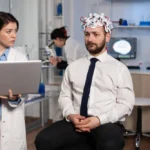Do you often find yourself lying awake at night, wondering why sleep seems so elusive? Insomnia is a common issue. Recognizing its signs and understanding its impact can be the first step towards finding a solution.
Insomnia, a prevalent sleep disorder, makes it hard to fall asleep and stay asleep. It also leaves you feeling tired in the morning. Most adults need 7 to 9 hours of sleep each night to feel their best.
Short-term insomnia, often caused by stress or anxiety, can last for days or weeks. It makes mornings tough and afternoons slow. For some, it becomes long-term or chronic Sleeplessness, lasting over three months and affecting daily life.
Understanding and recognizing sleeplessness symptoms is key to addressing the problem. Many factors, like stressful life events or medical conditions, can lead to sleepless nights. Spotting symptoms early can help you seek professional help or make lifestyle changes to better your sleep.
Key Takeaways
- Restlessness is characterized by difficulty in falling asleep, frequent night awakenings, and unrefreshing sleep.
- Most adults need 7 to 9 hours of sleep per night to function effectively.
- Short-term Restlessness is popular and often linked to stress or distressing events.
- Chronic sleeplessness lasts over three months and can significantly impact daily life.
- Recognizing early symptoms can help in seeking timely treatment or lifestyle changes.

Introduction to Insomnia
Sleeplessness is a sleep disorder that makes it hard to sleep well. It leads to health problems and lowers quality of life. Understanding Sleeplessness is key to grasping its full impact.
Understanding Sleeplessness
Sleeplessness makes it hard to fall asleep, stay asleep, or get good sleep. It comes in different types, like acute and chronic Restlessness. These types have different causes.
Sleep problems from Sleeplessness can hurt daily life and work. Causes include stress, medical issues, or bad sleep habits.
Prevalence and Impact
About 10-30% of adults have Restlessness at some time, with 6% having it for over a month. Also, 30% of adults have insomnia symptoms, and 10% face severe sleep loss. The American Academy of Sleep Medicine says 10-15% of adults have restlessness.
These numbers show how common Sleeplessness is. They also show why we need to tackle its health effects.
Why Sleeplessness Matters
Understanding Sleeplessness’s impact is very important. It raises the risk of heart disease, diabetes, and depression. It also costs a lot in medical bills and lost work.
Women are more likely to get sleep disorder than men. This shows a big difference in who gets it.
Common Symptoms of Sleeplessness
It’s important to know the signs of Sleeplessness to tackle it well. People often find it hard to fall asleep, wake up a lot at night, or wake up too early. They can’t go back to sleep.
Difficulty Falling Asleep
Falling asleep is hard for many, especially those with sleep disorders. Up to two-thirds of people sometimes struggle to fall asleep, even when they’re very tired. This can be tough for those with sleep disorders, as worries about sleep make it worse.
Waking Up During the Night
Waking up a lot at night is common for those with Sleeplessness. About 10% to 15% of people have chronic restlessness, waking up many times. This broken sleep messes up their sleep cycle and makes them feel tired all the time. Research shows African Americans often take longer to fall asleep and have poorer sleep quality than whites.
Feeling Tired Upon Waking
People with sleep disorders often wake up feeling tired and not refreshed. This makes it hard for them to function during the day, feeling slow and unproductive. Lack of good sleep also hurts their mood and memory, making things worse.
| Type of Sleeplessness | Duration | Risk Factors |
|---|---|---|
| Acute Sleeplessness | 1 night to a few weeks | Stress, changes in schedule, environmental factors |
| Chronic Isleep disorder | At least 3 nights a week for 3 months or more | Long-term illness, mental health issues, working night or rotating shifts, travel |
Daytime Symptoms of Insomnia
Sleeplessness’s effects aren’t just at night. They show up during the day too. A common sign is daytime sleepiness, where you feel like napping when you should be awake. This can really hurt your work and how alert you feel.
Another big problem is cognitive impairment. People with Type of Sleeplessness often have trouble focusing, remembering things, and making decisions.
Those with sleep disorder symptoms also feel mood swings and get easily irritated. This emotional rollercoaster comes from not getting enough sleep. It makes it hard to get along with others and can mess up personal relationships.
restlessness can also make you more likely to make mistakes or have accidents. This is true at work or even when driving, which is very dangerous. It can also make life feel less fulfilling for those dealing with these issues. Seeing these effects shows how big of a deal insomnia is, not just at night.
Short-term vs. Chronic Sleeplessness
It’s important to know the different types of sleep disorder to treat and manage them well. Insomnia is split into acute and chronic types, each with its own causes and lengths.
Acute Insomnia
Acute Sleeplessness, or short-term Sleeplessness, lasts less than three months. It’s often caused by big life changes, like job shifts or health issues. It affects both kids and adults, but women get it more than men. Fixing the stress behind it is key to solving acute Sleeplessness.
Chronic Insomnia
Chronic restlessness lasts over three months, happening at least three nights a week. It can come from irregular sleep, health problems, or other ongoing issues. Like acute insomnia, it’s more common in women and gets worse with age, especially in the elderly. Over 50% of older adults struggle with sleep, showing its big impact on this age group.
Primary and Secondary Insomnia
Sleep disorder can be primary or secondary, based on its cause. Primary insomnia isn’t linked to any other health issue. Secondary insomnia, however, is caused by another condition, like a medical problem or mental health issue. For instance, sleep disorder is often tied to anxiety and depression, making it complex to classify. Telling primary from secondary sleep disorder helps in creating the right treatment plans.
Mental Health and Insomnia Symptoms
Mental health issues like anxiety and depression often disrupt sleep. Studies show that about one-third of adults struggle with sleep disorder, which is often linked to mental health problems.
Insomnia is popular among those with psychiatric disorders. About 40 to 50% of people with Sleeplessness also have another mental health issue. This shows how closely sleep and mental health are connected. For example, PTSD can lead to sleep disorder, showing how mental health affects sleep.
Sleep disorder can make depression and anxiety worse, creating a cycle. Waking up too early is common in depression, while anxiety can make it hard to fall or stay asleep. This highlights the need to treat both Sleeplessness and mental health together.
Chronic sleep disorder affects over 50 million Americans, often linked to mental health issues. Studies also show sleep problems in children with anxiety, proving it’s not just for adults.
Daytime problems are popular in those with sleep disorder. About 10 to 15% struggle with daytime issues, showing how sleep affects mental health. Treating insomnia with therapy and mental health treatments is key to improving both sleep and mental health.
| Statistic | Value | Source |
|---|---|---|
| Adults reporting Sleep deprivation symptoms | 1/3 | |
| Sleep disorder sufferers with mental disorders | 40-50% | |
| Americans with chronic sleep disorders | 50 million | |
| Daytime functioning issues in Sleep deprivation sufferers | 10-15% |
Sleep deprivation in Different Age Groups
Sleep disorder is a problem that affects people of all ages. It brings unique challenges at each stage of life. The way it shows up can change a lot from children to older adults.
Sleep deprivation in Children and Teens
Children and teens with insomnia often resist going to bed and have trouble falling asleep. Things like not having a regular sleep schedule and using screens before bed are popular problems. Around 31% of young adults, including older teens, also deal with sleep disorder and depression.
To help kids and teens sleep better, it’s important to have a consistent bedtime routine. It’s also key to limit screen time before bed and deal with any emotional issues they might have.
Insomnia in Older Adults
Older adults often face sleep disorder due to changes in sleep patterns, health issues, and lifestyle. As people get older, their sleep can become more broken and light. They might also have chronic illnesses and take medicines that mess with their sleep.
Studies show that sleep disorders are very popular in the elderly. Sleep problems like restless legs and sleep apnea are also more common in older adults.
Here’s a quick look at how Sleep deprivation affects different age groups and what might cause it:
| Age Group | Prevalence of Sleep deprivation | popular Factors |
|---|---|---|
| Children and Teens | 31% in young adults | Pediatric sleep disorders, inconsistent schedules, screen time |
| Older Adults | varied rates, common in elderly patients | Age-related sleep disorder, chronic illnesses, medication use |
It’s important to know why Sleep deprivation happens in kids, teens, and older adults. This knowledge helps us find the right ways to help them sleep better.
Common Causes of sleep disorder
Sleep deprivation is a common sleep disorder that affects many people. About 35% of adults have it at some point. Knowing what causes sleep disorder can help improve daily life and health.
Stress-related Causes
Stress is a big reason for sleep disorder. Work, relationships, or money worries can mess with sleep. Studies show stress can keep you awake at night.
Anxiety and depression, caused by stress, also make it hard to sleep well.
Sleep-related Disorders
Conditions like sleep apnea and restless legs syndrome can also cause sleep disorder. Sleep apnea stops breathing many times a night, disrupting sleep. Restless legs syndrome makes you want to move your legs, which can also ruin sleep.
These disorders can lead to chronic sleep disorder, affecting daily life.
Lifestyle and Habits
Our modern lifestyle can also cause Sleep deprivation. Irregular sleep times, too much screen time before bed, and bad diets are big factors. Caffeine and nicotine before bed make it harder to sleep.
Late-night eating and poor sleep habits also make it tough to fall and stay asleep.
| Causes of Sleep deprivation | Impact |
|---|---|
| Stress and Anxiety | Disrupted sleep patterns, increased wakefulness |
| Sleep Apnea | Interrupted breathing, frequent nighttime awakenings |
| Restless Legs Syndrome | Urge to move legs, difficulty maintaining sleep |
| Poor Sleep Habits | Irregular schedules, excessive screen time, consuming caffeine |
Good sleep habits are key to fighting insomnia. Stick to a regular sleep schedule, make your bedroom sleep-friendly, and avoid caffeine at night. These steps can greatly improve your sleep.
Table of Contents
Insomnie: Causes and Risk Factors
Sleep deprivation has many causes, from environmental changes to health issues. Stress, genetics, and certain medications are big factors. It’s the most common sleep problem, affecting up to 35% of adults.
Age is a big risk factor, especially for older adults. They face a 30-48% risk of Sleep deprivation. Jobs that involve shift work or travel also increase the risk. Women are more likely to get sleep disorder due to hormonal changes and pregnancy.
Genetics can play a part, though rarely, in severe cases like fatal familial insomnia (insomnia risk factors). About 40% of people with sleep disorder also have psychiatric disorders. Sleep disorders like obstructive sleep apnea, affecting up to 20% of people, can also lead to insomnia.
Some medications can make it hard to fall or stay asleep, adding to insomnia’s causes. Almost 24% of teens struggle with sleep disorder, with noticeable gender differences.
Chronic sleep disorder lasts for more than three months and is common in those with chronic illnesses and psychiatric disorders. Stress from life changes and traumatic events also plays a big role.
These factors show how complex Sleep deprivation is. They highlight the need for a comprehensive approach to improve sleep health.
| Risk Factors | Prevalence | Details |
|---|---|---|
| Adults | 35% | Most common sleep complaint |
| Older Adults | 30-48% | Higher risk with aging |
| Teens | 23.8% | Rising with hormonal changes |
| Mental Health Disorders | 40% | Significant overlap with insomnia |
| Obstructive Sleep Apnea | 20% | Causes and worsens sleep disorder |
| Shift/Night Work | – | Increases risk |
| Women | – | Higher susceptibility |
| Medications | – | Can disrupt sleep patterns |
| Chronic Illnesses | – | Link with Sleep deprivation |
Long-term Effects of sleep disorder
Long-term sleep disorder can harm your health and happiness. It makes it hard to function daily and increases health risks. It can lead to heart disease, depression, and brain problems.
Research shows that not enough sleep raises your risk of death by 12% compared to those sleeping 7 to 8 hours. People with long-term sleep disorder are 97% more likely to die over 38 years.
sleep disorder can also make you feel anxious and depressed. 43% of American adults feel less alert during the day because of it. It affects their work and life quality.
Sleeplessness is common in people with chronic illnesses, affecting 48% of them. It’s also linked to 85 to 90% of chronic sleep disorder cases.
sleep disorder can change how your body works. It can affect your heart rate, with 38% of insomniacs showing differences. It also messes with your stress response, affecting 41% of people with insomnia.
The workplace is also impacted by insomnia. 42.8% of people with chronic Sleeplessness say it hurts their work. It can lead to accidents and lower productivity.
Addressing sleep disorder is key to improving health and work performance. Effective treatments and lifestyle changes are essential.
Conclusion
Managing insomnia is key to better sleep and health. It affects 20-35% of people, with 10-20% having severe cases. Sleeplessness not only disrupts sleep but also impacts daily life for 70% of those who suffer.
Good sleep habits are essential. This includes a regular sleep schedule, a calm sleep space, and avoiding screens before bed. For those who can’t sleep well, seeing a doctor is important. sleep disorder is linked to depression, showing the need for a full approach to treatment.
Sleeplessness also costs a lot, with $107.5 billion spent each year in the U.S.. This highlights the need for effective treatments. By focusing on sleep disorder, we can improve lives and reduce costs.
FAQ
What are the signs of insomnia?
Signs of insomnia include trouble falling asleep and waking up often. You might also wake up too early and can’t fall back asleep. Feeling tired in the morning and being sleepy during the day are common symptoms.
How prevalent is insomnia, and what impact does it have?
Insomnia is common among adults. It can make you feel tired, affect your mood, and hurt your work performance. It’s important to understand and treat it to improve your life.
Why is it important to address insomnia?
Sleep disorder impacts your health and well-being. It can affect your mood, memory, and physical health. If left untreated, it can lead to serious problems like heart disease and depression.
What are the common symptoms of Sleeplessness?
Symptoms include trouble falling asleep and waking up often. You might feel tired in the morning. These issues can cause fatigue, mood problems, and memory issues during the day.
What are the daytime symptoms of insomnia?
Daytime symptoms include feeling sleepy and tired. You might feel irritable or anxious. It can also affect your memory and lower your quality of life.
What is the difference between acute and chronic insomnia?
Acute Sleeplessness lasts a short time, from days to weeks. It’s often caused by stress or big life changes. Chronic Restlessness lasts months or more and can be linked to mental health or other health issues.
How does insomnia affect mental health?
Restlessness can make mental health problems worse. It can also be a sign of these issues. Poor sleep can worsen mental health, and bad mental health can disrupt Repose.
How does insomnia affect children and teens compared to older adults?
Kids and teens might resist bedtime and have trouble sleeping regularly. Older adults often experience changes in Repose due to aging and health issues. This can lead to more broken sleep.
What are common causes of insomnia?
Causes include stress, poor sleep habits, and irregular schedules. Medical conditions, mental health issues, and certain medications can also disrupt sleep. Sleep disorders like sleep apnea can contribute to Sleeplessness.
What are the risk factors and causes of insomnie?
Risk factors include stress, genetics, and environmental disruptions. Mental and physical health issues, medications, and sleep disorders can also play a role. Women, older adults, and those with irregular work schedules are at higher risk.
What are the long-term effects of chronic insomnia?
Chronic Sleeplessness can increase the risk of heart problems and depression. It can also impair cognitive function. Long-term sleep deprivation can lead to accidents and a lower quality of life.







